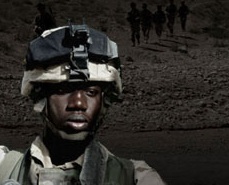 For some time, I’ve been hearing talk of “warriors” or “warfighters,” rather than “soldiers,” in my casual observation of the U.S. military. You hear this at all levels, from infantrymen referring to themselves, to the “warfighter standardized equipment” discussed at the highest echelons of the military-industrial mafia. At a recent talk in New York, the British journalist Robert Fisk brought home what this little switcheroo of words means. He compared the “Soldier’s Creed,” composed after the atrocities in Vietnam, to the “Warrior Ethos,” adopted in the early months of the Iraq War, apparently with Donald Rumsfeld’s blessing.
For some time, I’ve been hearing talk of “warriors” or “warfighters,” rather than “soldiers,” in my casual observation of the U.S. military. You hear this at all levels, from infantrymen referring to themselves, to the “warfighter standardized equipment” discussed at the highest echelons of the military-industrial mafia. At a recent talk in New York, the British journalist Robert Fisk brought home what this little switcheroo of words means. He compared the “Soldier’s Creed,” composed after the atrocities in Vietnam, to the “Warrior Ethos,” adopted in the early months of the Iraq War, apparently with Donald Rumsfeld’s blessing.
The difference between the two is a haunting reminder that, by 2003, the U.S. military had exorcised the lessons of Vietnam from its memory, paving the way for Abu Ghraib and so much else.
Both versions are on Wikipedia, at least right now. Or else look at the dramatic animated versions on the Army website, here and here. You see it is pretty clear from the visuals which one they consider more important nowadays.
Here is the first, evoking the responsibility and honor that our country expects from its people in uniform:
I am an American Soldier.
I am a member of the United States Army—a protector of the greatest nation on earth.
Because I am proud of the uniform I wear, I will always act in ways creditable to the military service and the nation it is sworn to guard.I am proud of my own organization. I will do all I can to make it the finest unit in the Army.
I will be loyal to those under whom I serve. I will do my full part to carry out orders and instructions given to me or my unit.As a soldier, I realize that I am a member of a time-honored profession—that I am doing my share to keep alive the principles of freedom for which my country stands.
No matter what the situation I am in, I will never do anything, for pleasure, profit, or personal safety, which will disgrace my uniform, my unit, or my country.
I will use every means I have, even beyond the line of duty, to restrain my Army comrades from actions disgraceful to themselves and to the uniform.I am proud of my country and its flag.
I will try to make the people of this nation proud of the service I represent, for I am an American Soldier.
And then, the 2003 Warrior Ethos. The difference is stark. It seems custom-built for John McCain’s insistence on the terms of victory and defeat rather than any subtler option. Destruction is held above honor.
I am an American Soldier.
I am a Warrior and a member of a team. I serve the people of the United States, and live the Army Values.
I will always place the mission first.
I will never accept defeat.
I will never quit.
I will never leave a fallen comrade.
I am disciplined, physically and mentally tough, trained and proficient in my warrior tasks and drills.
I always maintain my arms, my equipment and myself.
I am an expert and I am a professional.
I stand ready to deploy, engage, and destroy, the enemies of the United States of America in close combat.
I am a guardian of freedom and the American way of life.
I am an American Soldier.
According to Wikipedia, “Some soldiers shout ‘hooah’ at the conclusion.” Doesn’t this feel like a mistake?
Comments
4 responses to “When Soldiers Become Warriors”
The Rumsfield reformation marks the application of business rules to warfare. In this respect, the Army makeover should be considered a marketing move — I doubt McCain had a hand or motive in it.
Hooah!
No, I don’t mean to say that McCain had a hand in it. But he does play to that conditioning when he insists that the situation in Iraq can only be thought of in terms of victory and defeat.
The connection with marketing and business is interesting. I’ll think about that. Reminds me, again, of Adam Curtis’s Century of the Self documentary, which talks about how advertisers and politicians came to treat people as driven my unconscious desires rather than rational thought.
[…] After that I went to see The Curious Case of Benjamin Button with yet another friend. With the previews came Kid Rock’s promotional video for the National Guard, mixing rock ‘n’ roll with stock cars with benevolent, courageous soldiers. It’s called “Warrior.” (More on the implications of that term.) […]
Since I wrote this, the Vietnam-era creed has been abandoned. Now, the second text appears under both headings.